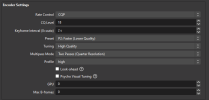I wanted to ideally record 4 sources, but I just have an NVIDIA RTX 3060. I know it's not possible. I was wondering if changing the encoding can enable me to record more. Say if I record 1 source with x264 and 1 with NVENC will it make a difference? [Since 1 will load the CPU and 1 will load the GPU - won't that let me record 2 with the NVENC and 1 with x264?]
I there a way to figure out how many sources I can actually record? Or do I have to do trial and error to find out.
Use case: I am trying to record a video podcast with each recording being an individual who joins the podcast. [So 1 for the scene record, and 3 for guests + me, me and 2 other guests].
And for those who do it differently what would you say I should do given my limitations. Is it better to maybe not record individual streams and rely on the main scene which has 3 sources? So just record the scene and 1 guest sources separately?
I there a way to figure out how many sources I can actually record? Or do I have to do trial and error to find out.
Use case: I am trying to record a video podcast with each recording being an individual who joins the podcast. [So 1 for the scene record, and 3 for guests + me, me and 2 other guests].
And for those who do it differently what would you say I should do given my limitations. Is it better to maybe not record individual streams and rely on the main scene which has 3 sources? So just record the scene and 1 guest sources separately?

